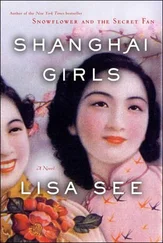Lisa See - Peony in Love
Здесь есть возможность читать онлайн «Lisa See - Peony in Love» весь текст электронной книги совершенно бесплатно (целиком полную версию без сокращений). В некоторых случаях можно слушать аудио, скачать через торрент в формате fb2 и присутствует краткое содержание. Жанр: Старинная литература, на английском языке. Описание произведения, (предисловие) а так же отзывы посетителей доступны на портале библиотеки ЛибКат.
- Название:Peony in Love
- Автор:
- Жанр:
- Год:неизвестен
- ISBN:нет данных
- Рейтинг книги:4 / 5. Голосов: 1
-
Избранное:Добавить в избранное
- Отзывы:
-
Ваша оценка:
- 80
- 1
- 2
- 3
- 4
- 5
Peony in Love: краткое содержание, описание и аннотация
Предлагаем к чтению аннотацию, описание, краткое содержание или предисловие (зависит от того, что написал сам автор книги «Peony in Love»). Если вы не нашли необходимую информацию о книге — напишите в комментариях, мы постараемся отыскать её.
Peony in Love — читать онлайн бесплатно полную книгу (весь текст) целиком
Ниже представлен текст книги, разбитый по страницам. Система сохранения места последней прочитанной страницы, позволяет с удобством читать онлайн бесплатно книгу «Peony in Love», без необходимости каждый раз заново искать на чём Вы остановились. Поставьте закладку, и сможете в любой момент перейти на страницу, на которой закончили чтение.
Интервал:
Закладка:
We owned thousands of mou planted with mulberry trees. In the Gudang area, not far from here, whole villages relied on our family for their livelihood. Baba cared for the people who raised the trees, harvested the leaves, fed and nurtured the silkworms, pulled the floss from the cocoons, spun thread, and, of course, made cloth. He told me what was required for each enterprise, and I began putting together the proper amounts.
“You don’t seem like yourself today,” my father said. “What troubles you?”
I couldn’t tell him about the young man I’d met or that I was worrying about whether or not I should meet him again in the Riding-the-Wind Pavilion, but if Baba could help me understand my grandmother and the choices she’d made, then maybe I’d know what to do tonight.
“I’ve been thinking about Grandmother Chen. Was she so very brave?
Did she have any moments when she was unsure?”
“We’ve studied this history—”
“The history, yes, but not about Grandmother. What was she like?”
My father knew me very well, and unlike most daughters I knew him very well too. Over the years I’d learned to recognize certain expressions: the way he raised his eyebrows in surprise when I asked about this or that woman poet, the grimace he made when he quizzed me on history and I answered incorrectly, the thoughtful way he pulled on his chin when I asked him a question about The Peony Pavilion for which he ( 2 7 )
didn’t know the answer. Now he looked at me as though he were weighing my worth.
“The Manchus had seen city after city fall,” he said at last, “but they knew that when they got to the Yangzi delta they’d find strong loyalist resistance. They could have chosen Hangzhou, where we live, but instead they decided to make Yangzhou, where my father served as a minister, a lesson to other cities in the region.”
I’d heard this many times and wondered if he’d tell me anything I didn’t already know.
“The generals, who until then had kept the soldiers under strict control, gave the order for their men to let loose their desires and take whatever riches they wanted—in the form of women, silver, silk, antiques, and animals—as reward for their service.” My father paused and regarded me in that same appraising way. “Do you understand what I’m saying . . .
about the women?”
In all honesty I didn’t, but I nodded.
“For five days, the city ran with blood,” he continued wearily. “Fires destroyed homes, halls, temples. Thousands and thousands of people died.”
“Weren’t you afraid?”
“Everyone was scared, but my mother taught us how to be brave. And we had to be brave in so many ways.” Again he scrutinized me as though considering whether or not to continue. He must have found me lacking, because he picked up a string of cash and went back to his counting. Without taking his eyes from the pieces of silver, he concluded, “Now you know why I prefer to look only at beauty—to read poetry, do my calligraphy, read, and listen to opera.”
But he hadn’t told me anything about Grandmother! And he hadn’t said anything that would help me decide what to do tonight or help me understand what I was feeling.
“Baba . . .” I said shyly.
“Yes,” he answered, without looking up.
“I’ve been thinking about the opera and Liniang’s lovesickness,” I blurted in a rushed tumble. “Do you think that could happen in real life?”
“Absolutely. You’ve heard of Xiaoqing, haven’t you?”
Of course I had. She was the greatest lovesick maiden ever.
“She died very young,” I prompted. “Was it because she was beautiful?”
“In many ways she was a lot like you,” Baba answered. “She was graceful and elegant by nature. But her parents, members of the gentry, lost ( 2 8 )
their fortune. Her mother became a teacher, so Xiaoqing was well educated. Perhaps too well educated.”
“But how can anyone be too well educated?” I asked, thinking of how happy I had just made my father by showing interest in his books.
“When Xiaoqing was a little girl, she visited a nun,” Baba answered. “In one sitting, Xiaoqing learned to recite the Heart Sutra without missing a single character. But as she was doing this, the nun saw that Xiaoqing did not have good fortune. If the girl could keep from reading, then she’d live to thirty. If not . . .”
“But how could she die of lovesickness?”
“When she turned sixteen, a man in Hangzhou acquired her to be a concubine and secreted her away just out there”—he gestured to the window—“on Solitary Island to keep her safe from his jealous wife. Xiaoqing was all alone and very lonely. Her only comfort came from reading The Peony Pavilion. Like you, she read the opera constantly. She became obsessed, caught a case of lovesickness, and wasted away. As she weakened, she wrote poems likening herself to Liniang.” His voice softened and color came to his cheeks. “She was only seventeen when she died.”
My cousins and I sometimes talked about Xiaoqing. We made up explanations for what we thought “being put on earth for the delights of men” might mean. But as Baba spoke, I saw that somehow Xiaoqing’s frailty and dissipation excited and fascinated him. He wasn’t the only man who’d been captivated by her life and death. Lots of men had written poems to her, and more than twenty had written plays about her. There was, I realized now, something about Xiaoqing and how she died that was deeply attractive and enthralling to men. Did my stranger feel the same way too?
“I often think of Xiaoqing as she reached the end of her days,” Baba added, his voice dreamy. “She drank only one small cup of pear juice a day.
Can you imagine?”
I was beginning to feel uncomfortable. He was my father, and I didn’t like thinking he might have feelings and sensations similar to the ones I’d had since last night when I had always told myself that he and my mother were distant with each other and that he received no real joy from his concubines.
“Just like Liniang, Xiaoqing wanted to leave behind a portrait of herself,” Baba went on, oblivious to my unease. “It took the artist three attempts to get it right. Xiaoqing grew more pathetic with each passing day, but she never forgot her duty to be beautiful. Each morning she dressed ( 2 9 )
her hair and clothed herself in her finest silks. She died sitting up, looking so perfect that those who came to see her believed her still to be alive.
Then her owner’s terrible wife burned Xiaoqing’s poems and all but one of the portraits.”
Baba gazed out the window to Solitary Island, his eyes glassy and filled with . . . pity? desire? longing?
Into the heavy silence, I said, “Not everything was lost, Baba. Before Xiaoqing died, she wrapped some jewelry in discarded paper and gave it to her maid’s daughter. When the girl opened the package, she found eleven poems on those abandoned sheets.”
“Recite one of them for me, will you, Peony?”
My father hadn’t helped me understand what I was feeling, but he did give me a glimmer of the romantic thoughts my stranger might be experiencing as he waited for me to come to him. I took a breath and began to recite.
“The sound of cold rain hitting the forlorn window is not bearable—”
“Please close your mouth!” Mama ordered. She never came here, and her appearance was startling and unsettling. How long had she been listening? To my father, she said, “You tell our daughter about Xiaoqing, but you know perfectly well she was not the only one to die upon reading The Peony Pavilion. ”
“Stories tell us how we should live,” my father responded easily, covering the surprise he must have felt at my mother’s presence and her accu-satory tone.
Читать дальшеИнтервал:
Закладка:
Похожие книги на «Peony in Love»
Представляем Вашему вниманию похожие книги на «Peony in Love» списком для выбора. Мы отобрали схожую по названию и смыслу литературу в надежде предоставить читателям больше вариантов отыскать новые, интересные, ещё непрочитанные произведения.
Обсуждение, отзывы о книге «Peony in Love» и просто собственные мнения читателей. Оставьте ваши комментарии, напишите, что Вы думаете о произведении, его смысле или главных героях. Укажите что конкретно понравилось, а что нет, и почему Вы так считаете.












